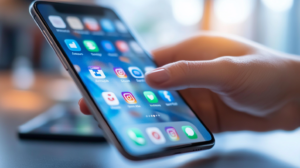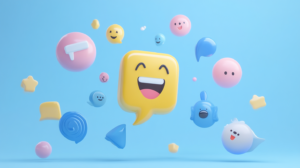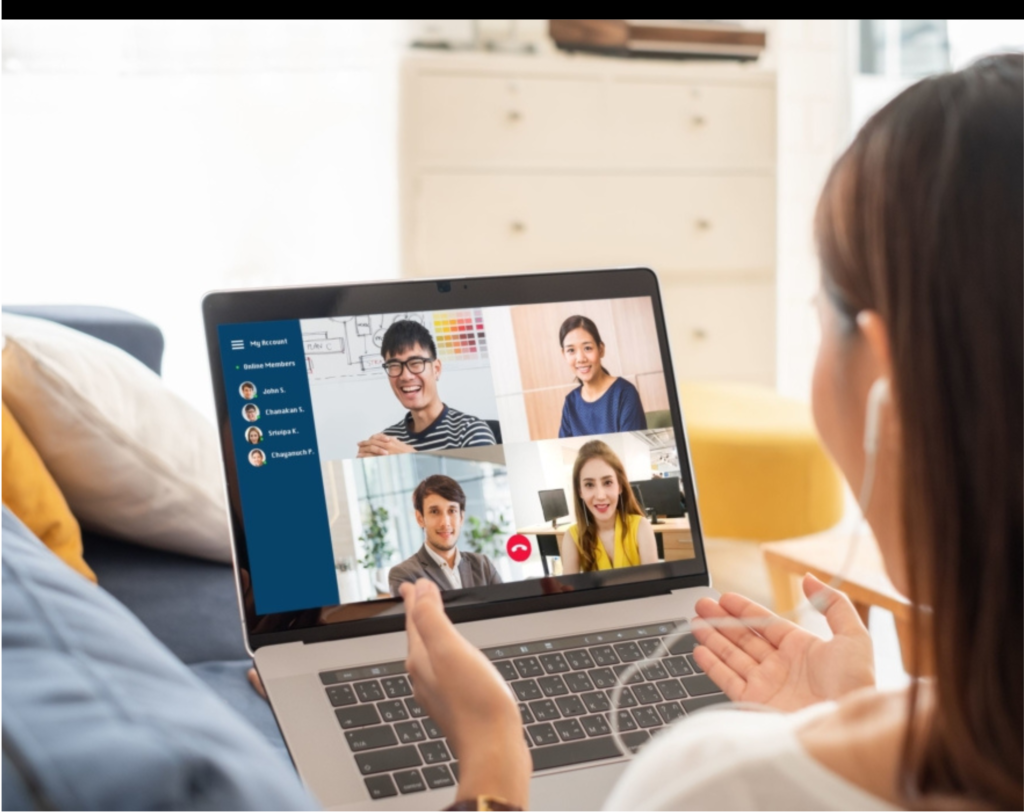
Present Simple Tense 1
English Blogs “Let’s Learn, Explore, and Connect to the World” Present Simple Tense 1 I. Introduction to the Present Simple Tense in English Mastering the



 The arena of digital marketing has completely changed over the last few years. This is because new technologies keep coming out and people’s habits on the internet keep evolving. Initially, digital marketing strategies were predominantly focused on email blasts and banner ads, which were broad in their approach and often missed the mark regarding personal connection and engagement. As the internet became more interactive and social media platforms emerged, marketers quickly recognized the potential of these new channels to connect more directly and meaningfully with audiences.
The arena of digital marketing has completely changed over the last few years. This is because new technologies keep coming out and people’s habits on the internet keep evolving. Initially, digital marketing strategies were predominantly focused on email blasts and banner ads, which were broad in their approach and often missed the mark regarding personal connection and engagement. As the internet became more interactive and social media platforms emerged, marketers quickly recognized the potential of these new channels to connect more directly and meaningfully with audiences.
Facebook is offering businesses a wide array of tools to reach and engage with their target audience. However, it’s not just Facebook’s traditional news feed ads that have captured the attention of marketers. Facebook Messenger, launched in 2011, has evolved into a powerful marketing tool in its own right. With over 1.3 billion active users monthly, Messenger offers a unique conduit for businesses to host direct, personalized, and real-time conversations with customers, unlike any other platform.
This shift towards more direct and personalized communication via Facebook Messenger marks a pivotal development in digital marketing strategies. Businesses can now connect to their audience not just in a public or semi-public setting like a Facebook wall or comment section, but in the intimate and personal space of a Messenger chat. This capability to connect one-on-one has opened new avenues for customer service, sales, and overall engagement. In this way, Messenger is not just another marketing channel but a critical tool in the modern marketer’s arsenal, allowing for the delivery of messages crafted to connect with people on a more personal level,this emphasizes the emotional connection aspect and thereby driving higher engagement and conversion rates.
 The importance of Facebook Messenger in today’s marketing landscape cannot be overstated. As consumers increasingly expect instant and personalized interactions, Messenger’s role continues to grow as a necessary and dynamic platform for effective digital marketing. This blog will explore how businesses can get the most out of Facebook Messenger not just to communicate but to connect and convert, transforming everyday interactions into lasting customer relationships.
The importance of Facebook Messenger in today’s marketing landscape cannot be overstated. As consumers increasingly expect instant and personalized interactions, Messenger’s role continues to grow as a necessary and dynamic platform for effective digital marketing. This blog will explore how businesses can get the most out of Facebook Messenger not just to communicate but to connect and convert, transforming everyday interactions into lasting customer relationships.

Facebook Messenger marketing is a form of digital communication that allows businesses to engage directly with their customers through Facebook’s messaging platform. This approach is designed to leverage the ubiquity and familiarity of Messenger, providing a seamless integration between browsing and real-time communication. Unlike traditional marketing channels that often broadcast one-way messages, Messenger marketing enables a two-way conversation, fostering a more personalized and engaging customer experience.
Messenger marketing encompasses several strategies, including automated chatbots that handle initial customer inquiries, targeted and sponsored messages based on users’ behavior, and live customer support. These interactions can be tailored to the individual’s preferences and previous interactions with the brand, making each conversation more relevant and increasing the likelihood of conversion.
 Facebook Messenger boasts impressive statistics that highlight its potential as a marketing channel. Here are some key figures:
Facebook Messenger boasts impressive statistics that highlight its potential as a marketing channel. Here are some key figures:
These statistics highlight the strategic advantage of using Facebook Messenger as a marketing tool. It not only allows businesses to reach a large audience but also engages them in a way that is both preferred by consumers and conducive to deeper relationships. By understanding the power of Messenger marketing, businesses can more effectively craft campaigns that maximize engagement and drive substantial business outcomes.
 Marketing through Facebook Messenger provides numerous benefits for companies aiming to improve their digital marketing efforts. The platform not only facilitates communication with vast audiences but also ensures that these interactions are more personalized and engaging. Here are some of the key benefits:
Marketing through Facebook Messenger provides numerous benefits for companies aiming to improve their digital marketing efforts. The platform not only facilitates communication with vast audiences but also ensures that these interactions are more personalized and engaging. Here are some of the key benefits:
 One of the foremost benefits of using Facebook Messenger for marketing is the ability to communicate with customers instantly. Unlike traditional methods that often involve delays (such as email where responses can take hours or even days), Messenger allows for real-time dialogue. This immediacy can be crucial during various stages of the customer journey, especially when consumers are making purchasing decisions or need urgent support. Instant communication helps maintain the flow of conversation, mimicking the natural back-and-forth of in-person interactions, which can lead to quicker conversions and enhanced customer relations.
One of the foremost benefits of using Facebook Messenger for marketing is the ability to communicate with customers instantly. Unlike traditional methods that often involve delays (such as email where responses can take hours or even days), Messenger allows for real-time dialogue. This immediacy can be crucial during various stages of the customer journey, especially when consumers are making purchasing decisions or need urgent support. Instant communication helps maintain the flow of conversation, mimicking the natural back-and-forth of in-person interactions, which can lead to quicker conversions and enhanced customer relations.
 Messenger marketing excels in its capacity for message personalization. With access to data from users’ Facebook profiles and past interactions with the brand on the platform, businesses can tailor their communications to meet the particular preferences and requirements of every client. Personalized messages can include everything from addressing the customer by name to making recommendations based on previous purchases or browsing behavior. This level of customization makes the customer feel valued and understood, thereby increasing the effectiveness of the marketing efforts.
Messenger marketing excels in its capacity for message personalization. With access to data from users’ Facebook profiles and past interactions with the brand on the platform, businesses can tailor their communications to meet the particular preferences and requirements of every client. Personalized messages can include everything from addressing the customer by name to making recommendations based on previous purchases or browsing behavior. This level of customization makes the customer feel valued and understood, thereby increasing the effectiveness of the marketing efforts.
 The expectation for quick responses in today’s digital world is higher than ever. Facebook Messenger enables businesses to meet these expectations through automated responses or chatbots that can provide instant answers to common queries around the clock. For more complex inquiries, the platform facilitates a seamless handoff to human customer service representatives. This blend of automation and personal touch and ensures that customer inquiries are addressed promptly, significantly boosting customer satisfaction and loyalty.
The expectation for quick responses in today’s digital world is higher than ever. Facebook Messenger enables businesses to meet these expectations through automated responses or chatbots that can provide instant answers to common queries around the clock. For more complex inquiries, the platform facilitates a seamless handoff to human customer service representatives. This blend of automation and personal touch and ensures that customer inquiries are addressed promptly, significantly boosting customer satisfaction and loyalty.

Messenger marketing also boasts higher engagement rates compared to many other digital marketing platforms. The interactive nature of Messenger, combined with the familiarity and comfort users have with the platform, leads to better open and click-through rates. Messages sent via Messenger are typically brief and direct, tailored for swift reading and replying, aligning with the contemporary consumer’s inclination towards quick and easy communication. This efficiency not only enhances user experience but also drives higher engagement, making it a powerful tool for marketers aiming to capture and retain consumer attention.
Facebook Messenger marketing offers distinct advantages that can transform customer interactions into more meaningful connections. Its ability to provide instant, personalized communication, combined with high engagement rates and increased customer satisfaction, makes it an invaluable component of modern digital marketing strategies.
 Implementing Facebook Messenger as a marketing tool involves several strategic steps that enable businesses to effectively communicate and engage with their customers. Here’s a guide to setting up and optimizing Messenger for marketing purposes.
Implementing Facebook Messenger as a marketing tool involves several strategic steps that enable businesses to effectively communicate and engage with their customers. Here’s a guide to setting up and optimizing Messenger for marketing purposes.
 The first step in utilizing Messenger for marketing is setting up a business account. This can be done through your existing Facebook Business Page. If you don’t already have one, you’ll need to create a Facebook Page for your business. Once your Page is set up, ensure that the Messenger feature is activated. You can then customize your Messenger settings, such as greeting texts and instant replies, to align with your business’s tone and customer engagement strategy.
The first step in utilizing Messenger for marketing is setting up a business account. This can be done through your existing Facebook Business Page. If you don’t already have one, you’ll need to create a Facebook Page for your business. Once your Page is set up, ensure that the Messenger feature is activated. You can then customize your Messenger settings, such as greeting texts and instant replies, to align with your business’s tone and customer engagement strategy.

Integrating Messenger into your overall marketing strategy is crucial for creating a cohesive customer experience. Start by including Messenger as a contact option in all digital marketing materials, such as your website, email signatures, and social media posts. Encourage customers to contact you through Messenger for quick replies.
Additionally, you can use Messenger to send updates about promotions, new products, or events directly to customers who opt-in.This direct communication channel proves highly efficient for tailored marketing and urgent offers.
 To manage interactions efficiently, especially if you anticipate a high volume of inquiries, employing automated tools like chatbots is advisable. Chatbots can handle common customer queries, provide information about products and services, and guide users through the purchasing process. These tools can be customized to reflect your brand’s voice and provide consistent, helpful service even when live agents are not available.
To manage interactions efficiently, especially if you anticipate a high volume of inquiries, employing automated tools like chatbots is advisable. Chatbots can handle common customer queries, provide information about products and services, and guide users through the purchasing process. These tools can be customized to reflect your brand’s voice and provide consistent, helpful service even when live agents are not available.
While automation is beneficial, maintaining a human touch is essential for creating genuine connections with your customers. Ensure that your chatbots are programmed to transfer more complex queries to human representatives when necessary. Regularly review chat histories to personalize future communications and avoid overly generic responses.
Additionally, train your team to handle transitions from chatbots smoothly and empathetically to enhance the customer experience. By following these steps, businesses can effectively implement Facebook Messenger marketing, combining efficiency and personalization to build stronger relationships and improve customer engagement.
Facebook Messenger has been a game-changer for many businesses, from small startups to large corporations. Here are a few notable case studies that illustrate the successful use of Messenger marketing, showcasing the diverse strategies and significant results achieved.

Sephora, a leading beauty retailer, leveraged Facebook Messenger to streamline their booking process for in-store services. By implementing a chatbot, Sephora made it easy for customers to schedule makeovers without navigating away from their favorite messaging app. This strategy led to an impressive 11% increase in booking rates compared to other channels. The ease of use and immediate nature of Messenger helped Sephora enhance customer convenience and satisfaction.
Pizza Hut

Pizza Hut used Messenger to facilitate easier and faster ordering for customers. Their Messenger bot could remember past orders, offer deals, and allow users to reorder their favorites with just a few clicks. This not only improved the ordering experience but also increased customer retention rates. The bot contributed to a higher conversion rate as customers appreciated the blend of convenience and personalization.
UNICEF

UNICEF’s U-Report bot on Messenger serves as an excellent example of non-commercial use, aiming to empower young people around the world by engaging them in meaningful conversations about social issues. The bot asks opinion-based questions and collects data to help influence public policy. With millions of users participating, UNICEF has been able to gather valuable insights and actively involve the youth in societal development, demonstrating Messenger’s potential beyond direct marketing.
These case studies show that Messenger can be a powerful weapon for a variety of marketing objectives, including increasing sales, improving booking rates, and facilitating engagement on important issues. The key strategies these businesses implemented—personalization, ease of use, and integration into broader campaigns—have led to tangible improvements in customer interaction and satisfaction. These successes underscore the versatility and effectiveness of Messenger marketing in connecting with customers on a platform they use daily.
 With ongoing technological advancements, the realm of Messenger marketing is set to undergo substantial transformation. Here are a few predictions and emerging technologies that are likely to shape the future of this dynamic marketing channel.
With ongoing technological advancements, the realm of Messenger marketing is set to undergo substantial transformation. Here are a few predictions and emerging technologies that are likely to shape the future of this dynamic marketing channel.
Integration of Advanced AI and Machine Learning: AI and machine learning are expected to deepen their integration into Messenger marketing, enhancing the intelligence of chatbots to manage more intricate interactions. This will lead to a smoother and more personalized customer experience, with bots able to predict user needs and provide proactive solutions before the customer even makes a request.
Augmented Reality (AR) Experiences: AR technology is beginning to make its way into Messenger marketing. Brands could use AR to allow customers to try products virtually through the Messenger app, such as trying on clothes or visualizing furniture in their homes. This integration can dramatically enhance the decision-making process for customers and increase engagement rates.
Enhanced Data Privacy and Security: As consumers become more conscious of their digital footprints, there will be a stronger emphasis on privacy and security within Messenger marketing. Businesses will need to implement stricter data protection measures and transparent privacy policies to maintain trust and compliance.
Voice Technology Integration: The incorporation of voice technology into Messenger could provide a more accessible and convenient option for users, allowing them to send voice messages and receive information via voice responses. This shift would cater to the growing preference for voice-over text and could expand Messenger’s utility.
These trends indicate a future where Messenger marketing not only becomes more interactive and personalized but also more secure and user-friendly, helping businesses to foster deeper and more trustworthy connections with their clientele.
 Facebook Messenger marketing has proven itself as a pivotal tool in the digital marketing arsenal, offering unparalleled opportunities for direct and personalized communication with customers. With its capacity for instant messaging, high engagement rates, and scalable automation through AI and chatbots, Messenger empowers businesses to connect with their audience in meaningful ways. As we look towards the future, the potential enhancements in technology promise even greater effectiveness and opportunities. Businesses looking to have an edge in the competitive digital landscape should consider adopting Messenger strategies to enhance customer interaction, drive engagement, and ultimately, boost conversion rates.
Facebook Messenger marketing has proven itself as a pivotal tool in the digital marketing arsenal, offering unparalleled opportunities for direct and personalized communication with customers. With its capacity for instant messaging, high engagement rates, and scalable automation through AI and chatbots, Messenger empowers businesses to connect with their audience in meaningful ways. As we look towards the future, the potential enhancements in technology promise even greater effectiveness and opportunities. Businesses looking to have an edge in the competitive digital landscape should consider adopting Messenger strategies to enhance customer interaction, drive engagement, and ultimately, boost conversion rates.

English Blogs “Let’s Learn, Explore, and Connect to the World” Present Simple Tense 1 I. Introduction to the Present Simple Tense in English Mastering the

English Blogs “Let’s Learn, Explore, and Connect to the World” Present Simple Tense 2 II. Understanding the Present Simple Tense Definition and Structure At its

Discover your inner editing abilities with this complete guide made for beginners to master the art of video editing smoothly. ‘A Beginner’s Guide to Video Editing: Be a Pro in Just 24 Hours’ is your way to discover the secrets of professional-grade editing within a day.



